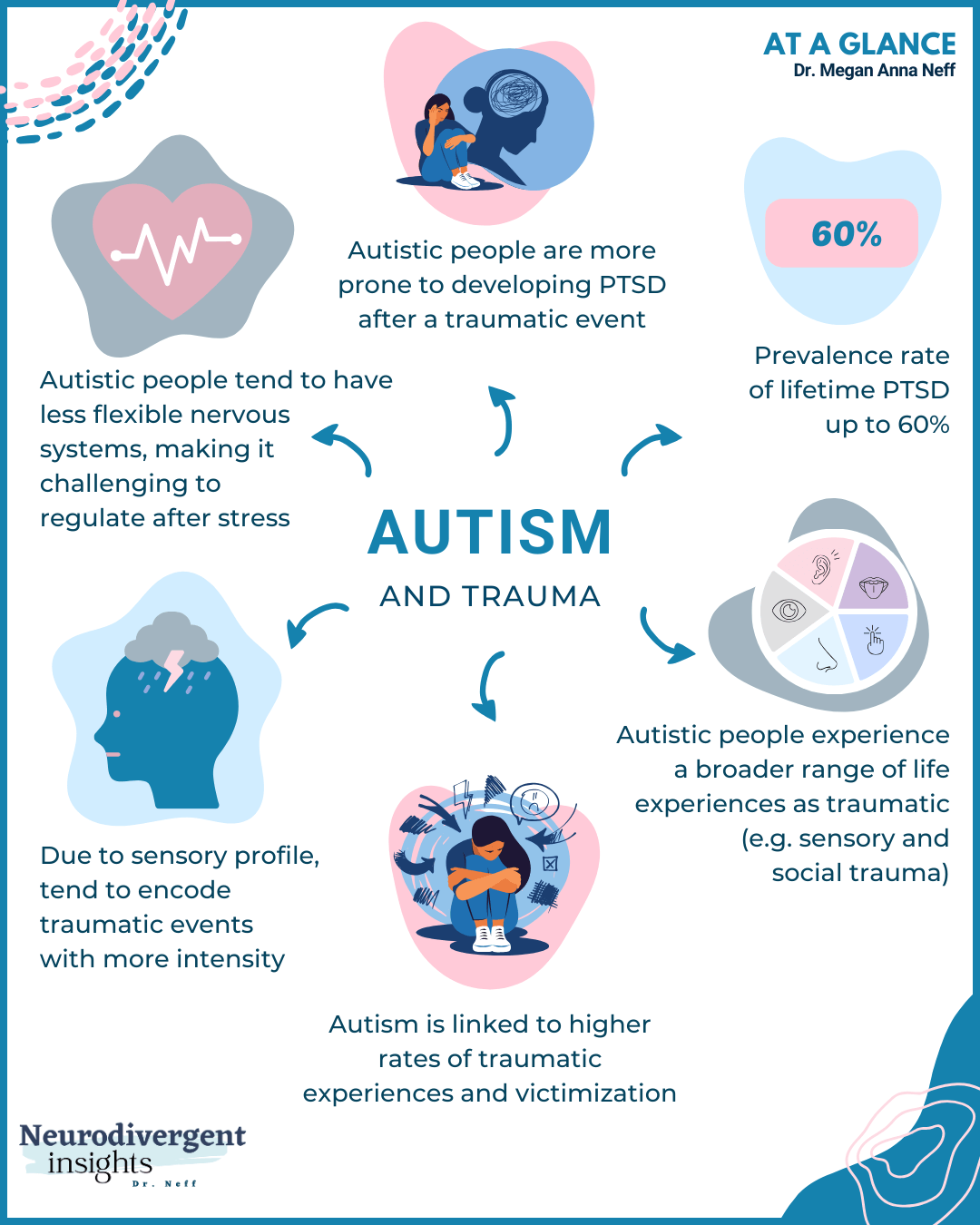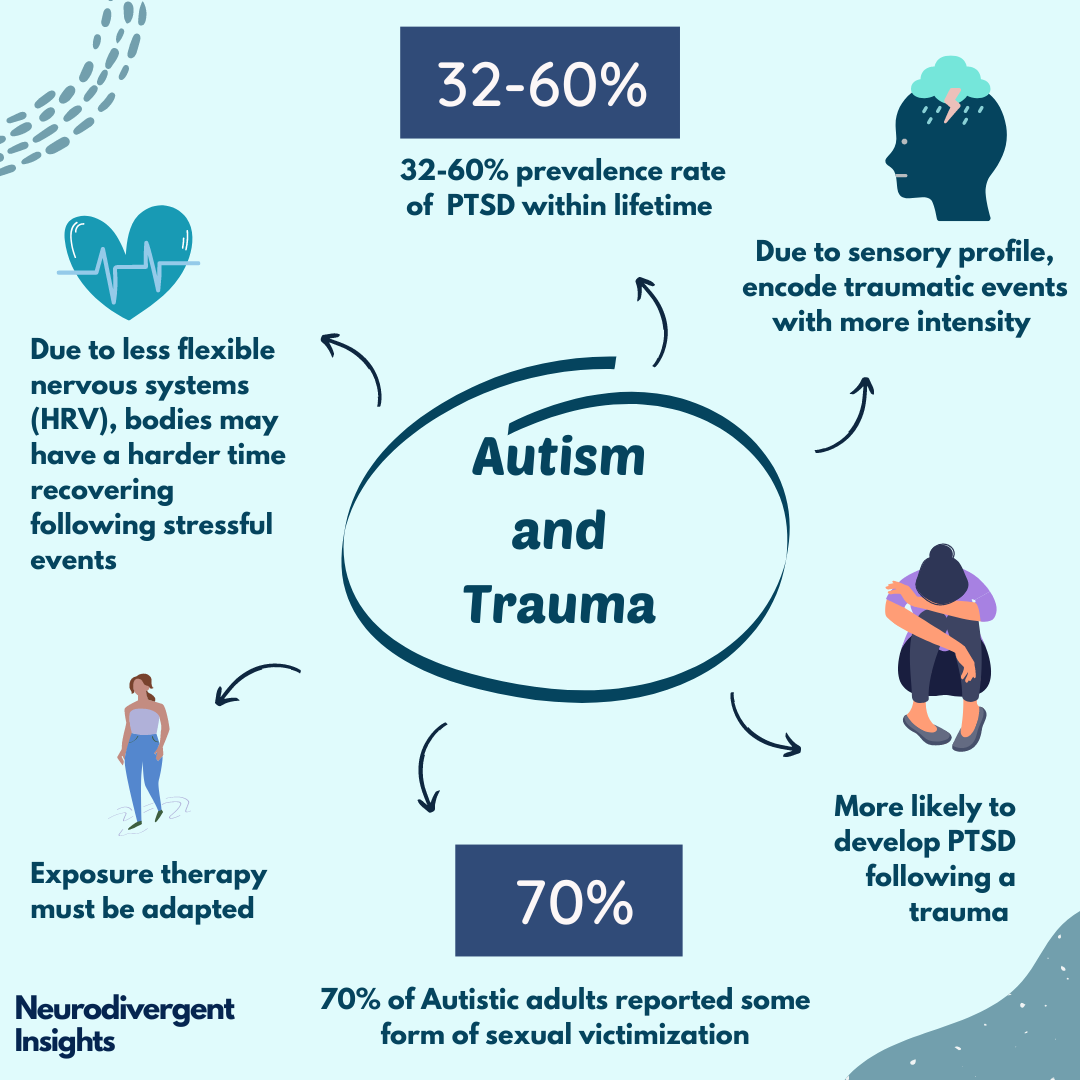How are Autism and Trauma Related?
Autism and Trauma
Autism and trauma co-occur at high rates. Despite how commonly trauma and autism co-occur, there is limited research on this, and it is rarely talked about in clinical training. Autistics are more at risk of PTSD due to several factors:
We have more vulnerable neurobiology (more reactive nervous systems)
Increased risk of victimization
Sensitive sensory profiles that encode memory with more intensity
The stress of navigating an allistic world.
Women and genderqueer people are particularly vulnerable to PTSD (Haruvi-Lamdan, 2020). Following is a summary of the research cited in the above image:
Rumball et al. (2020) study found that approximately 60% of autistics reported probable PTSD in their lifetime (compare this to 4.5% of the general population).
Haruvi-Lamdan et al., 2020 study found that 32% of their Autistic participants had probable PTSD compared to 4% of the non-autistic population.
Fenning et al, 2019 research demonstrated that autistic children had more reactive nervous systems. This aligns with similar research that has identified the autistic nervous system to be less flexible (Thapa and Alvares, 2019). Less flexible nervous systems have a more difficult time coping with acute stressors and may contribute to increased hyperactivation of the nervous system following trauma.
Neurodivergent (ADHD/Autism) neurobiology is more vulnerable and reactive: (Beauchaine et al., 2013)
We are more vulnerable to social victimization and marginalization. Haruvi-Lamdan et al., 2020 found that Autistic females (but not males) reported more negative life events, particularly social events, than typical adults.
Brown-Lavoie et al., 2014 found that 70% of Autistic adults reported experiencing some form of sexual victimization after the age of 14 (compared to 45% of the control group).
Beyond traditional PTSD triggers, Autistic individuals may experience a broader range of life experiences as traumatic, including sensory and social trauma, potentially leading to PTSD-like symptoms (Rumball et al., 2020).
Additional Considerations
Autistic people who mask are more likely to be diagnosed with PTSD while their neurotype goes missed. This means they are less likely to receive Autistic-adapted treatments for their PTSD.
Undiagnosed Autistic people are less likely to receive education about our increased risk (we have an increased risk of both victimization and of developing PTSD following the stressful event). It is for this reason that I always say that an accurate and timely diagnosis of autism is trauma prevention.
When a person’s Autistic identity is combined with other marginalized identities, the risks, stress, and strain of the above factors increase.
Autistic Adapted Trauma Treatment
While exposure therapy is typically seen as the “gold standard” for PTSD treatment, such treatment may not be appropriate for all Autistic people. When using such treatment, certain adaptations should be made. Here are some key considerations when adapting exposure-based therapy for Autistic clients:
Sensory Sensitivities: Autistic individuals do not experience sensory habituation in the same way as neurotypical individuals. Moreover, the presence of sensory irritants in the environment can add to the overall stress load. Therapists should prioritize creating a sensory-soothing environment when conducting exposure-based therapy.
Sensory Encoding: Due to our detail-oriented processing (specifically sensory information), many Autistic may experience a heightened sensory memory associated with trauma (Rumball et al., 2020). This should be considered when working with trauma narratives and exposure-based therapy.
Meltdowns vs. Trauma Triggers: Therapists must differentiate between meltdowns and trauma triggers and understand how trauma triggers, especially those linked to visceral sensory memories, can lead to meltdowns. Having a prepared plan to address meltdowns and pacing exposure work is essential when working with Autistic clients.
Psychoeducation: Psychoeducation is a fundamental aspect of trauma treatment and is especially crucial when working with Autistic clients. Providing clear expectations reduces uncertainty and fosters psychological safety, which is essential for effective exposure therapy. Visual aids, drawing, and incorporating special interests can make psychoeducation more accessible and engaging.
Incorporate Special Interests: Special interests can serve as powerful self-soothing and distraction tools. While distraction is often seen as emotional avoidance and counterproductive for exposure work, it can be beneficial when managing sensory meltdowns (Dr. Jonathan Dalton, Anxiety: A Strength-Based Perspective, Neurodivergent Insights Masterclass, 2023). Therapists should not hesitate to use distraction techniques when necessary when working with Autistic clients.
While not specific to trauma, you can see Ailsa Russell, Amita Jassi, Kate Johnston book Autism and OCD for examples of how to adapt exposure-based work for Autistic people.
When using exposure therapy with Autistic individuals, it should be adapted and led by the client. Trauma treatment should take into account the individual's sensory experience, incorporate special interests and visual education, grounding techniques, bodywork, and encourage natural forms of movement for regulation. Some effective trauma treatments for Autistic individuals may include Somatic Therapies, EMDR (Eye Movement Desensitization and Reprocessing), and Internal Family Systems Theory. However, it's essential to recognize that each Autistic person is unique, and what works for one may not work the same way for another. Tailoring the approach to the individual's specific needs is crucial.
Resources
My Favorite Autism Reads: Divergent Minds
Good resources for Trauma: The Body Keeps the Score








